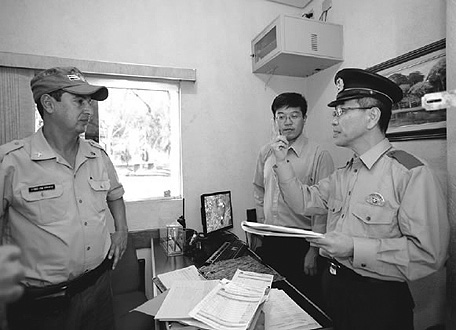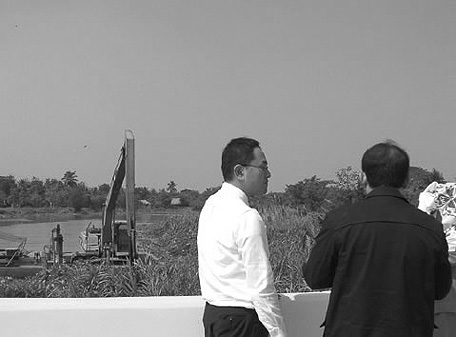Japan's Official Development Assistance White Paper 2011
(4) Policy Formulation and Institution Building
For the sustainable growth of developing countries, not only the establishment of the socio-economic infrastructure, but also the policy formulation, institution building, and human resources development are important. It is essential to support eradicating corruption, legal and institutional reforms, improving the efficiency and transparency of public administration, and strengthening the administrative capacity of local governments.
<Japan's Efforts>
As part of its support in policy formulation and institution building, Japan provides assistance for development of the legal system. Improvement of the legal system serves as the foundation for development of the country through self-help efforts that are based on good governance. Assistance for this sector is a typical example of person-to-person cooperation between Japan and the recipient countries, and plays a role in "Visibility of Japanese Aid."
In addition, improvement of the legal systems in developing countries through such measures will also improve the work environment for Japanese companies that work in those countries. Accordingly, it plays an extremely important role in support for the New Growth Strategy (see "Terminology" on page 43) including the "Deployment of Integrated Infrastructure Systems" (see "Terminology" on page 43) to prepare institution building. Japan's assistance for the improvement of legal systems comes through its "soft power," and serves as the underpinning for strengthening Asia's potential for growth.
Moreover, for democratic development Japan supports the institution building for legal, judicial, administrative, public service, and police systems, support for the implementation of democratic elections, strengthening of civil society, and aid improvement of women's status. Japan also provides support for the prevention of corruption, the development of statistical capabilities, and the enhancement of the abilities of local governments.
For the issues of criminal justice Japan also support the training and seminars for professionals on the criminal justice of developing countries in Asia and the Pacific through the United Nations Asia and Far East Institute for the Prevention of Crime and the Treatment of Offenders (UNAFEI).
Japan provides assistance for the policy formulation and institution building not only for specific projects, but also for financing the national accounts of local government.
In the area of capacity building of police agencies that constitute a cornerstone in maintenance of domestic security, Japan transfers the knowledge and technology and experiences of the Japanese police in international cooperation, provides equipment, and assists in the preparation and maintenance of facilities, while emphasizing the development of human resources, including creation of systems and improvement of administrative capabilities. The National Police Agency dispatches experts to and accepts trainees mainly from Asian countries such as Indonesia and the Philippines. Through this, Japan strives to transfer the attitudes, investigative abilities, and forensics technology of the democratically controlled Japanese police, who are trusted by the Japanese people.

A Japanese expert specialist gives advice on improvements to a Brazilian police supervisor in a police box in Sao Paolo, Brazil as part of the "Project on Implementation of Community Policing Using the Koban System" (Photo: Shinichi Kuno/JICA)
[Thailand]
"Project on Enhancing the Capacity of Local Public Service Provision through Local Coordination and Cooperation"
Technical Cooperation Project (February 2010 - Current)
In 1997, the constitution of Thailand was amended to promote decentralization. However, the size of each municipality providing public service is small, and under the present situation, municipalities are unable to provide the level of public services required as a result of decentralization. Therefore, municipalities are required to provide public services efficiently by collaborating with other municipalities. This project aims to focus its efforts on important areas. For example, it is important for governing bodies higher than the prefectural level to support municipalities (cities, towns, and villages). Thus, the project aims to transfer the technologies and skills for efficient public services by share the knowledge and experience gained through coordinating with higher-level governments with municipalities. Through these efforts, the project is expected to improve the ability of the municipalities to providing public services that support the foundation of people's lives, and to contribute to Thailand's further development.

A Japanese expert inspects a joint project (removal of weeds from irrigation canals) between adjacent municipalities (Photo: JICA)
